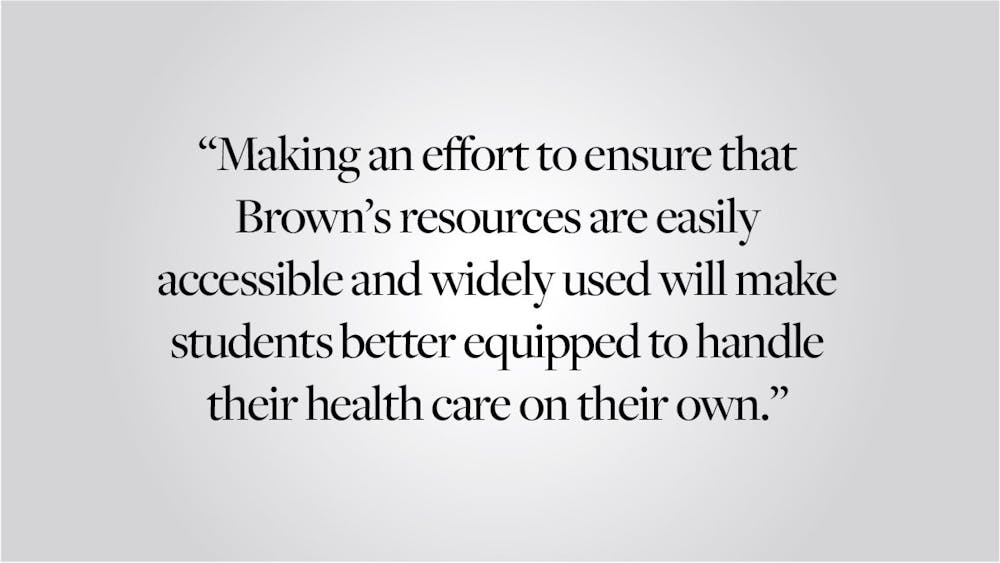Over Thanksgiving break, I finally caught the inaugural first-year sickness. On Wednesday, I felt a sore throat coming on. By Thursday, I got a headache, and on Friday, I went through bouts of chills and sweating. A feverish temperature reading at Health Services confirmed my sickness, and I reluctantly joined the unfortunate group of first-years struck by sickness during their first semester of college.
Brown students falling ill is an experience so universal that it’s become the topic of jokes and nicknames on campus. In October, for example, the “Keeney cough” overtook South Campus, along with its North Campus equivalent, the “Metcough,” a riff on Metcalf Hall. Almost everyone on my floor has been in some state of illness during the past two months, some people multiple times. Medications and mysterious elixirs for sinus infections, runny noses and fevers are constantly being passed between my hallmates.
For first-years, I have observed ample confusion about the extent of health insurance coverage, when it is appropriate to go to class, what medical support Brown offers and where to get a proper dean’s note to excuse missed homework and assignments. For those first-years unlucky enough to test positive for COVID-19, it was difficult to isolate with roommates.
The problem is not necessarily a paucity of resources on Brown’s campus, but a lack of knowledge on what they are and how to obtain them. Many first-years falling sick may be dealing with their own health care for the first time in their lives, which could make them vulnerable to misinformation and poor decision-making. Brown should develop a comprehensive guide on how to navigate student sickness so first-years can more easily locate and utilize necessary health resources to aid their personal and academic needs.
The “freshman plague” is a phenomenon that is prevalent across American college campuses. It makes sense that first-years get sick easily: Close contact is inevitable when students are sharing rooms, showers, desks and dining tables. Additionally, the stress of a new environment, lack of sleep and exposure to new germs can all contribute to sickness. Missed tests and homework assignments because of sickness can also compound student stress.
Currently, Brown’s “Sickness Support" webpage recommends filling out the Sickness Support Request Form, which notifies Student Support Services of students’ needs, and contacting Health Services for care. Brown’s BWell page is also a great source for health information on how to manage colds. When I was ill, these online resources and the staff at Brown’s Health and Wellness Center were helpful, but I still felt relatively lost on how to plan my academic schedule around my sickness. I knew I had to get a dean’s note if I wanted to have excused class absences, but was unsure exactly what the process was for asking for one — did I ask my advising dean? Would she need to see the report showing my diagnosis of a fever? For my friends who contracted COVID-19, negotiating essay deadlines and when to retake midterms with professors was a hassle, and their roommates struggled to find a dorm room willing to take them in while their roommate was in isolation. But the University’s existing guidelines on how to navigate sickness at Brown are often buried within confusing web pages, making it difficult for students to find specific information.
Brown needs to close this information gap among first-years, preferably early on as a part of orientation week. Information on how to set an appointment with a physician at Health Services, where to buy medication and when and how to obtain a dean’s note should be made easy to access and understand for first-years. The health services that are offered on campus and the locations of the closest urgent care facilities and emergency rooms should also be directly communicated to students.
While it’s possible to argue that Brown’s hands-off approach presents an opportunity for students to develop health care independence, failing to provide first-years with clear guidelines and information related to sickness is not an effective way to promote a healthy campus. Making an effort to ensure that Brown’s resources are easily accessible and widely used will make students better equipped to handle their health care on their own. After all, as long as the Keeney cough is around, students will continue to use Brown’s health care services.
Juliet Fang ’26 can be reached at juliet_fang@brown.edu. Please send responses to this opinion to letters@browndailyherald.com and other op-eds to opinions@browndailyherald.com.
Juliet Fang is a second year at Brown studying Ecology and Evolutionary Biology. In her free time, she enjoys running, cycling, and watching duck videos.





